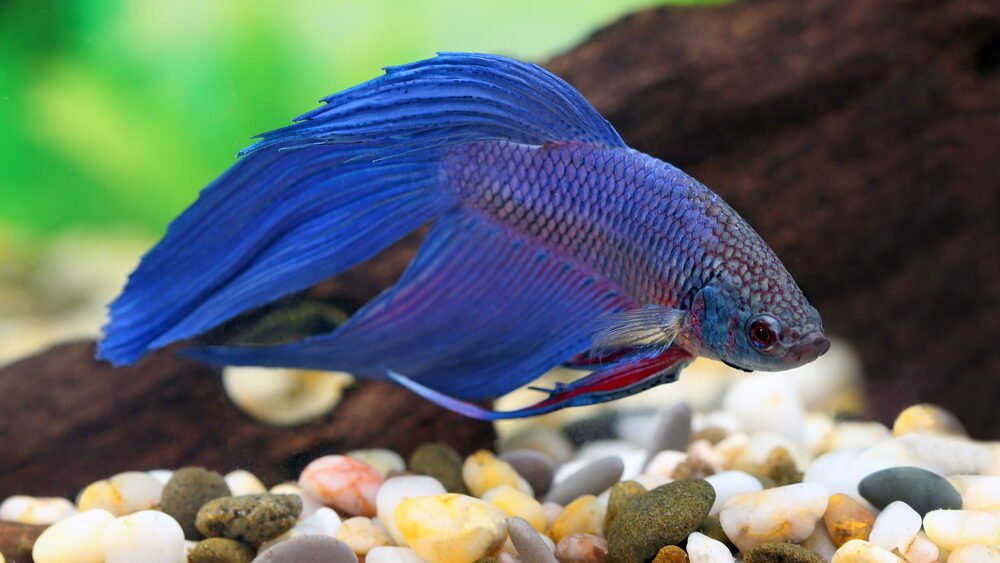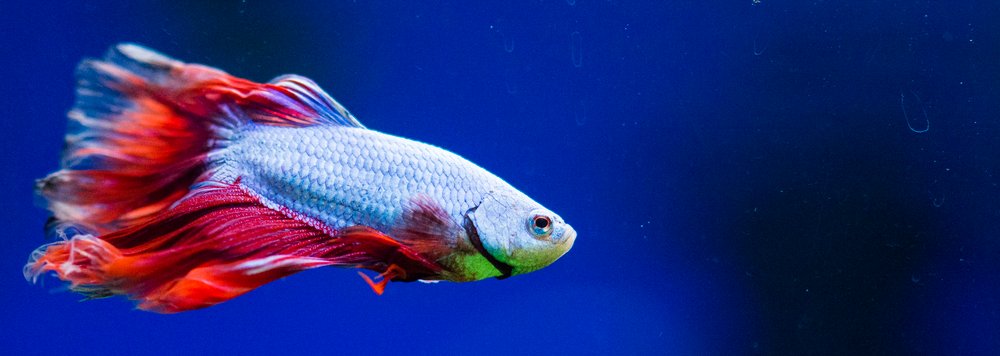Will Betta Fish Kill Each Other, Guppies, Goldfish or Plecos?
Hi there. Did you know that bettas are total cold-blooded savages? They are good at macerating with their charismatic swimming, colorful pattern, and innocent look. But please don’t get fooled when the Siamese fighting fish shows you their good side. In their peaceful tank, will betta fish kill other fish such as guppies, goldfish, plecos, and other bettas? You bet! And they won’t even express a sliver of mercy.
As betta owners, we need to know this. So hold on to your fins, and let’s dive deep beneath the surface and discover the dark secrets bettas keep hidden in their genes – their brutal, aggressive, and territorial nature and everything you need to know.
Do bettas kill other fish?

Other similar-sized fish fear the fierce betta fish, as their aggressive behavior and territorial traits can get the best of them.
Specifically, male bettas are infamous for attacking other innocent fish that they may view as a threat and will go to great lengths to fend them off what they consider their territory (but you may feel it’s a community tank). They’re also known by another name, the Siamese fighting fish, and scientifically as Betta Splendens.
During a betta fish fight, they don’t give a rat’s tail about the community and society. They didn’t survive millennia in the wild by being pushovers but by finding perfect habitats and protecting them no matter what. Even if they don’t need to act tough anymore in captivity, they still carry their survival instincts – it’s in their nature.
Factors that can cause bettas to attack or kill other fish.
Here are a few factors that may contribute to the violence you see in bettas:
- Overcrowing. A small tank can make the fish feel their space is insufficient for all of them to live together.
- Poor water quality. Terrible water conditions are another reason that fish can feel stress, which can increase aggression.
- Fish with bright colors and long fins. These traits trigger the aggression instinct in bettas and may cause them to nip or bite at the fins. Why? Some experts believe that fish with these traits remind the betta of themselves, and they don’t want another rival messing in their business, fighting for the same food resources, mates, and hiding places.
How to prevent your betta fish from attacking or killing other fish

Here are a few tips you can follow to prevent aggression and violence from betta toward other fish in your aquarium:
- Choose tank mates that are non-aggressive, without bright colors or long fins, that tend to live in different depths of the tank. Bettas prefer shallow water around 12 inches or 30 centimeters in depth.
- Have various territories and several hiding places for your betta to claim.
- Keep your tank clean and water conditions good to keep your fish happy and reduce unnecessary stress.
- Consider having a separate tank or tank divider for your bettas if they act aggressively toward their tank mates.
How do bettas kill other fish?
Here are a few common behaviors you may see in your betta that are signs of aggression:
- Flaring of the gills and fins to make themselves look bigger and more intimidating. It’s the fish’s way of communicating, “if you mess with me, you’re asking for trouble.”
- They chase other fish, swim behind them, and bite and nip at their fins.
- They are inflicting physical damage. If bettas feel like being total savages, they may even rip off other fish’s fins, leave wounds or even murder them ruthlessly. Bettas aren’t kidding around; they’re cold-blooded (literally and figuratively) and mean business!
Will bettas kill specific types of fish?

Let’s look at the likelihood of bettas killing other fish, such as guppies, goldfish, plecos, and other typical tank mates.
Please understand that betta fish target some fish more than others based on their appearance and behavior (yes, bettas are discriminating creatures). Especially goldfish and guppies are more prone to being harassed because of their long fins and bright colors.
While plecos are total sweethearts that wouldn’t hurt a fly, they are still not safe from being chased by the betta. Bettas feel threatened by fish of similar size that may compete with them for food, space, and mates. The pleco is a peaceful bottom dweller of the aquarium, and the betta prefers shallow water with easy access to the surface. If you wish to house both fish in the same tank, you may want a larger tank with sufficient size and depth and have areas with shallow and deep water so the two fish can claim their habitats.
If you plan on keeping male and female betta fish together, you should be very careful, as the male may attack and kill females. Guidelines often recommend that males and female bettas are kept in separate tanks to prevent conflict and bloodbaths.
Will betta fish kill snails and other invertebrates?
Good news: Introducing snails, shrimps, and other invertebrates to your betta tank will have a much less chance of conflict and violence. These tranquil creatures hang out around the bottom of the tank, and they will be out of the betta’s way if you provide enough tank space and hiding spots.
But let’s not forget that bettas are still the bullies of the fish tank. There is always a risk when dealing with these hot-tempered brutes, so carefully choose the most betta-compatible invertebrates by researching beforehand.
Betta fish fight: Can bettas kill each other?

Do you want to put two bettas in the same tank? Hold onto your gills! Poop is about to hit the fin!
Seriously, this is when your bettas start flexing hard, and the potential for an absolute bloodbath is the greatest.
Especially two male bettas are notorious for fighting and killing each other. If you house them together, it won’t turn out well for one of them.
The biggest competitor and rival to a male betta’s territory, habitat, food, potential female mate, and offspring are other male bettas. It would be best to keep them separated to prevent fighting and fatalities.
Female bettas are calmer than their male counterpart but still exhibit aggressive traits toward each other, so keeping them separate is a good idea.
Preventing betta fish from killing others in the tank and peacefully live together
Here are a few strategies to create a peaceful, zen-like community in your community tank and diffuse aggression in bettas:
- Choose tank mates that are compatible with bettas. Consider their species, size, temperament, appearance, and preferred location in the tank.
- Have many areas and hiding spots in your tank so fish can retreat, hide, rest and chillax. You don’t want them all swimming on top of each other, crowding together, and being annoyed by one another. That causes aggression and stress.
- Keep the tank maintained and clean. Check the temperature, pH levels, pollutants, and water conditions, and adjust accordingly to create the best atmosphere.
- Use tank dividers or multiple tanks to separate persistently aggressive bettas from the other animals.
- Slowly and gradually introduce new tank friends to the tank, and give everyone time to acclimate and adjust to their new habitat.
- Give the proper amount of food to everyone. If there is enough food, it can reduce the risk of fish fighting over limited resources. However, overfeeding can lead to more waste, worsen aquarium water conditions, and leave your bettas unsatisfied, which may spike aggression.
How to tell if a betta is killing other fish and what to do

Here are a few signs to look for if you suspect that your betta might be contemplating a killing spree (or physically abusing the others):
- Look for aggressive behavior, such as nipping and chasing other fish.
- Look for physical injuries, torn fins, bite marks, and wounds.
Here’s what you do if you notice aggressive behavior:
- Remove the injured fish immediately in a plastic bag filled with water from the tank (remember to acclimate it to any new water you place it in)
- Separate your betta from the other fish in another tank, or use a tank divider.
- Evaluate if there are any reasons or causes for the bad behavior, and look at the list above.
- Consult an expert, such as a veterinarian, to aid your injured fish.
What to do if your male betta has already killed another fish
Once your betta har murdered another fish, there is not much you can do for the dead fish. The only thing is to reflect on the situation and how you could have prevented it in the first place, and with your new knowledge, you can now prevent other fish from suffering the same fate. Follow the tips outlined above.
Alternatives to keeping bettas with other fish

You don’t have to keep your betta in the community tank with others if it causes trouble for everyone. You can have it live alone in a solitary tank.
Some people think bettas will be lonely in solitary confinement, but that’s the least of your worries. There are benefits to keeping them in a separate tank. Consider how much less stressed it will be when none of the annoying tank mates are there to trespass on their property. Nothing will trigger the betta’s aggressive instincts, and they can relax their gills, lower their fins, and swim around in harmony.
When creating a new tank for your sole betta, remember to follow all the same guidelines and care for it as much as you do for the other tank. Have a variety of shelters, dark and light areas, plants, decorations, and ideal water conditions. Give it good food and care for it with love.
Conclusion: Should you keep bettas with other fish?
If we weigh the pros and cons of keeping a betta together with other fish species, the most logical outcome is that the best idea is to keep the betta in a solitary tank or its own space using a tank divider. It may be more maintenance, but it’s a win-win for everyone.
Frequently Asked Questions
Will a betta fish kill a guppy?
Maybe. A betta fish tend to fight other fish and may kill guppies who live in the same tank, but they can coexist peacefully under optimal tank conditions and if the betta keeps calm.
Will a betta fish kill a goldfish?
It is possible. A betta can kill goldfish because it feels threatened by its similar size, bright color, and long fins, making it a natural rival for the betta.
Do betta fish kill each other?
Yes. Especially male bettas fight each other because they see each other as rivals for the same territory, food, and potential mates.
Do male betta fish kill females?
Yes. Even though the fish are counterparts and you’d suspect them being mates, male bettas can attack female bettas and kill them. They don’t even need to get along to breed. Female bettas lay their eggs in a bubble nest built by the male betta, and the male stays to protect the eggs until they hatch into fry.
Do female betta fish kill each other?
Even though females are less aggressive than males, they can still fight and kill each other if they feel threatened or if someone is trespassing or encroaching on their territory.
Can bettas be kept with other fish in the same tank?
It is possible to keep bettas with other fish in the same tank, but it requires careful planning and consideration. Choose non-aggressive, compatible tank mates and provide plenty of hiding places and territory for your betta. Be prepared to make adjustments and separate your betta if necessary to prevent aggression.
How can I prevent my betta from attacking and killing other fish?
Choose compatible tank mates and keep tank conditions optimal. If that doesn’t work, keep your betta in a separate tank or with a divider.
What should I do if my betta has already killed another fish?
There is little you can do. Prevent other fish from becoming victims by separating your aggressive fish from others. Also, consult with a veterinarian if your fish is injured or sick.

